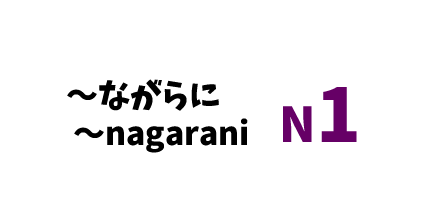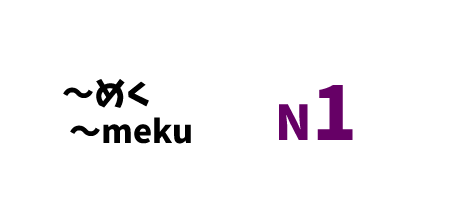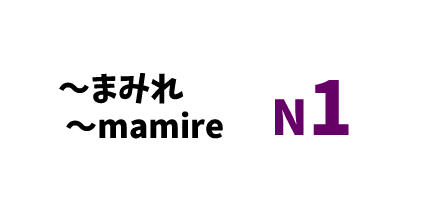
【N1】~ながらに / ~nagara ni
~ながらに ~nagara ni (adsbygoogle = window.adsbygoogle || []).pu...
This website for your JLPT,Japanese proficiency test! 日本語能力試験対策

~ながらに ~nagara ni (adsbygoogle = window.adsbygoogle || []).pu...

~めく ~meku (adsbygoogle = window.adsbygoogle || []).push({}...

~まみれ ~mamire (adsbygoogle = window.adsbygoogle || []).push...

~いかん ~ikan (adsbygoogle = window.adsbygoogle || []).push({})...

~はおろか ~wa oroka (adsbygoogle = window.adsbygoogle || []).pus...

~ごとき ~gotoki (adsbygoogle = window.adsbygoogle || []).push({...

~と相まって ~to aimatte (adsbygoogle = window.adsbygoogle || [])....

~はずです supposed to be (adsbygoogle = window.adsbygoogle ||...

~かどうか whether~ (adsbygoogle = window.adsbygoogle || []...

あえて.. dare to.. How to say " dare to.. ." in Japanese. ...

Meaning/意味 cannot help doing, cannot (help) but do; cannot refra...

( reason) kara, ( situation) (adsbygoogle = window.ads...

( ~そうです)It looks like~ (adsbygoogle = window.adsbygoog...

( ~てみる)to try something out (adsbygoogle = window.adsb...

frequency of events over a period of time (adsbygoogle...

かもしれない maybe~ (adsbygoogle = window.adsbygoogle || [])...

~たらどうですか:advice, recommendation (adsbygoogle = window....

Japanese counters (adsbygoogle = window.adsbygoogle ||...

Volitional Form (adsbygoogle = window.adsbygoogle || [...

~ておく ,do something in preparation for something (adsby...

~てあげる ,do something for someone (adsbygoogle = window....

~といい ,I hope, I wish.. (adsbygoogle = window.adsbygoogle |...

~そうです (I hear) (adsbygoogle = window.adsbygoogle || []).push...

あげる/くれる/もらう (adsbygoogle = window.adsbygoogle || []).p...

~なくてもいいです: need not (adsbygoogle = window.adsbygoogle ...

~みたいです looks like.. (adsbygoogle = window.adsbygoogle...

~前に/~てから before.../after... (adsbygoogle = window.adsbygoogl...

~てしまう do something completely (adsbygoogle = window.ad...

~ながら while~ (adsbygoogle = window.adsbygoogle || []).p...

~ばよかった should have done something (adsbygoogle = windo...

~くれてありがとう Expressing gratitude (adsbygoogle = window.a...

~てよかったです I am glad that ... (adsbygoogle = window.adsb...

~ないで without doing something (adsbygoogle = window.ads...

Nameという item called (name) (adsbygoogle = window.adsby...

ほしい I want something (adsbygoogle = window.adsbygoogle...

~やすい easy to do something (adsbygoogle = window.adsbyg...